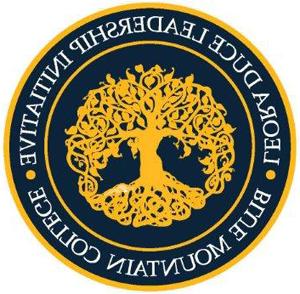Leora Duce Leadership Initiative
 The Leora Duce Leadership Initiative at Blue Mountain College is designed to build intellectual integrity, civility, Christian Character, servant leadership, and service—all of which are essential to becoming a successful leader on campus and in the future. These characteristics all are a part of the Blue Mountain College Mission. Leadership, at Blue Mountain College, is defined as the willingness and ability to influence others positively.
The Leora Duce Leadership Initiative at Blue Mountain College is designed to build intellectual integrity, civility, Christian Character, servant leadership, and service—all of which are essential to becoming a successful leader on campus and in the future. These characteristics all are a part of the Blue Mountain College Mission. Leadership, at Blue Mountain College, is defined as the willingness and ability to influence others positively.
By obtaining a Blue Mountain College leadership diploma, students should be able to demonstrate the following characteristics:
- Engagement in problem solving and making informed judgments
- Improvement and maintenance of physical and psychological well being
- Engagement in team-building and cooperative efforts
- Development of skills for making responsible moral choices based upon an understanding of biblical principles
- Development of individual initiative
- Engagement in service and civility as a way of life
- Improvement in the ability to communicate effectively in all settings
- Improvement of skills in servant leadership
 To aid students in the development of leadership skills, a new leadership diploma is being offered to all students. The diploma is based on the model of servant leadership as best demonstrated in the Bible.
To aid students in the development of leadership skills, a new leadership diploma is being offered to all students. The diploma is based on the model of servant leadership as best demonstrated in the Bible.To earn a leadership diploma at Blue Mountain College, a student must earn at least 100 points by completing their choice of a variety of activities. Once a student has completed an activity, he or she has one week to record it by emailing details of his or her participation or submitting the activity to Coordinator of Leadership. (Since this program is new, current sophomores, juniors and seniors may request diploma credits for past activities to enroll in the program. Upper class students have until October 1, 2016 to submit past activities to the director.)
The diploma program is based on the Blue Mountain College Honor System and Honor Code. Should a student falsely submit participation in an activity, that student forfeits the right to earn the leadership diploma. Violation of Blue Mountain College policy may also result in the student being ineligible for the leadership diploma.
Some other campus events will count for leadership credit. To stay abreast with the ongoing opportunities for earning leadership points, please consult the BMC Web site at 3ixadkc.shangangren.com.
Points System for the Blue Mountain College Leadership Diploma
2 points each- Participate in a leadership workshop sponsored by Blue Mountain College
- Participate in a designated leadership residential hall program
- Join LinkedIn and complete a profile
- Join a campus academic club/organization
- Meet with the Coordinator of Student Success and Career Services
- Attend a career fair
- Practice interviewing skills in the Student Success and Career Services Office
- Send a handwritten thank you letter to someone who has impacted your life
- Utilize the Teaching and Learning Center
- Serve as a member of the Baptist Student Union Council
- Serve as a society officer
- Serve as an honor society officer
- Serve as a Ministerial Association officer
- Serve as an admissions tour guide
- Nominate another student for the leadership diploma program
- Create and submit a personal business card design
- Vote in a state or national election
- Hold a leadership position in an academic club/organization
- Serve as a class officer
- Attend the BMC academic research day
5 points each
- Attend an approved leadership conference (off campus)
- Participate in a leadership retreat offered by BMC organizations
- Hold a leadership position in the SBA or BSU
- Serve as President of a society (Eunomian, Euzelian, Modenian, Berean, Ecclesian)
- Participate in an athletic team on campus for at least 2 years
- Participate in a long-term Bible Study
- Serve on an official College committee
- Complete 5 service hours and a reflection assignment
- Create and submit a résumé
- Conduct a research project
- Participate in a theatrical or musical performance
- Submit an original literary/art work to the Mountain Breeze
- Serve as an SBA representative
- Serve as a class president
- Serve as president of an academic honor society
- Serve as editor of the Mountain Breeze, Mountaineer, or BM Seer
- Volunteer work at the Palmer-Donnell House
10 Points each
- Complete an internship
- Publish a research paper
- Become a resident assistant
- Create a new Blue Mountain College club or organization that remains active for at least one year
- Complete 10 hours of service and a reflection assignment
- Serve as president of the Student Body Association
- Serve as president of the Baptist Student Union
- Serve as a BSU Student Summer Missionary
- Participate in a scholarship program, including XXXXXXXXXX
- Create and present a leadership workshop
- Complete an approved academic leadership course
- Serve as a tour guide of the Palmer-Donnell House
Required of all participants:
 Freshman Year: First-year students must choose two senior leadership capstone presentations to view.
Freshman Year: First-year students must choose two senior leadership capstone presentations to view.Sophomore Year: Second-year students must submit a leadership portfolio which includes their personal leadership statements and a résumé.
Junior Year: Juniors must submit a personal statement of at least 500 words. Personal statements should reflect individual passions and goals of understanding of what leadership means to the individual submitting. Juniors will also submit names of 10-20 peers, faculty, or staff to the Coordinator of Leadership to participate in an anonymous leadership review. Results will be shared with the student.
Senior Year: Capstone Presentation--seniors will prepare a 10-15 minute multimedia presentation that is videotaped and reviewed by a group of Blue Mountain College professionals. The presentation will include:
- The top three leadership areas in which the student has grown during his or her undergraduate career
- The main leadership area in which the student needs to grow and his or her plan for improvement
- The student’s plan for the future, how the plan was researched, and how the student chose the next steps in life.

